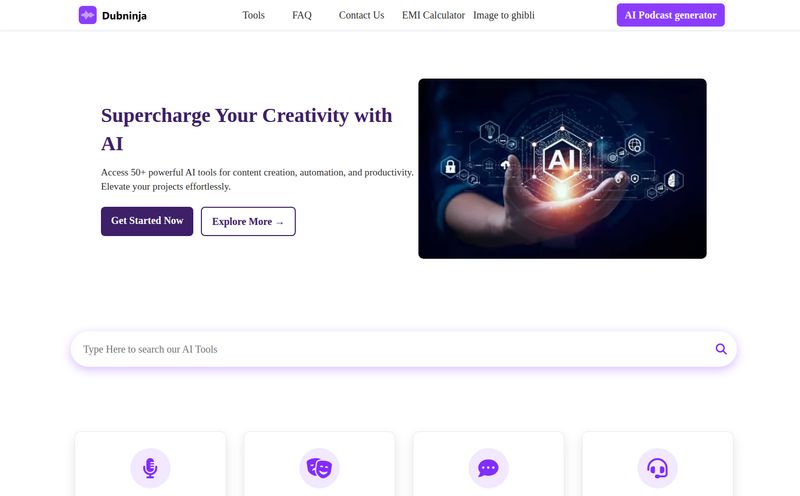The content treadmill is exhausting. As an SEO, I’ve lived on that thing for years. You publish, you optimize, you track, you see a little bump, and then you have to do it all over again. Tomorrow. And the day after. The promise of “automating” your blog has been the holy grail for as long as I can remember, a promise that has almost always ended in disappointment, usually in the form of terribly spun articles or content that reads like a robot having a stroke.
Then came the AI boom. Suddenly, everyone and their dog launched a tool that could “write anything.” And honestly? Most of them are just shiny wrappers for the same underlying tech. They can be helpful, sure, but they don't solve the core problem. You still have to do the research, the prompting, the editing, the formatting, the publishing... the work.
So when I stumbled upon Satellitor, my default skepticism was fully engaged. It doesn’t just claim to be an AI writer. It claims to be a fully automated SEO blog solution. A bold claim. One that could either be a game-changer or another letdown. I had to take a look.
So, What Exactly is Satellitor?
At its heart, Satellitor pitches itself as an AI SEO agency designed for people who don't have time to be a full-time SEO agency. Think busy founders, stretched marketing teams, and solopreneurs. The big hook isn't just that it uses AI; it's how it uses it. They have this 80/20 model: 80% of the heavy lifting (drafting, structuring, basic SEO) is done by AI, and the final 20%—the crucial part—is handled by humans for quality assurance.
This, for me, was the first thing that made me lean in a little closer. It’s not just handing you the raw, often weird, output from an AI. It’s a service. It's like having a super-fast junior writer (the AI) who generates the bulk of the material, and then a human editor who swoops in to make sure it's coherent, factually sound, and doesn't have any of that classic AI weirdness. A very interesting proposition.

Visit Satellitor
How Satellitor Promises to Automate Your Content Workflow
The process they lay out seems almost suspiciously simple. You’re not wrestling with complex settings or learning a whole new software. It boils down to three steps:
- Provide a few details: You tell it about your business, your target audience, and your goals. The basics. Who are you talking to and what do you want to say?
- Let the blog write itself: This is where the magic (or at least, the automation) happens. The platform takes your inputs and starts generating articles.
- Connect and auto-publish: You hook it up to your platform of choice—they show integrations for WordPress, Ghost, Webflow, and even Shopify—and the content gets published automatically. Set it and, supposedly, forget it.
The idea of connecting it directly to my WordPress site and having posts just appear is the dream, isn't it? No more copy-pasting, no more fighting with the block editor. That alone is a massive time-saver if it works as advertised.
The Core Features That Caught My Eye
Scouring their site, a few things stood out beyond the basic AI writing.
More Than Just an AI Writer
One of the most surprising offerings is the ability to get an “SEO blog from SCRATCH.” They mention providing a domain name, a brandable name, a logo, and even hosting. This pushes Satellitor from being just a content tool into a full-blown platform-building service. For someone who is starting from absolute zero, that could be incredibly valuable. It removes a ton of technical hurdles right off the bat.
The Human-in-the-Loop Approach
I have to come back to the 80/20 split because it's so important. I've tested dozens of pure AI writers, and the content almost always requires significant editing to be truly “good.” It can be repetitive, factually incorrect, or just lack any real soul. By having a human review process baked in, Satellitor is directly addressing the biggest weakness of AI content generation. It's an admission that AI isn't perfect, which, paradoxically, gives me more confidence in the service.
Breaking Language Barriers with Multilingual SEO
The site clearly shows support for multiple languages like Spanish, German, and French. For any business looking to expand into international markets, this is huge. Running a multilingual SEO strategy is complex and expensive. The potential to automate even a piece of that across different languages from a single platform is a massive competitive advantage.
The Big Question: What About the Content Quality?
Okay, let's talk about the real make-or-break factor: the content itself. In a post-Helpful Content Update world, just churning out AI-generated articles is a recipe for disaster. Google has been very clear: they reward content created for people, not just for search engines. The quality has to be there.
Satellitor claims its content is “high-quality” and will improve search rankings. The 20% human touch is their ace in the hole. But I’ve always believed that even with a human editor, the quality of AI output is heavily dependent on the quality of the initial input. Garbage in, garbage out, as they say. You'll still need a clear strategy and provide the platform with smart direction. It's a partnership, not a magic wand. I'd be very curious to see how it handles a truly niche or technical topic versus a more general one.
Let's Talk About Pricing and That 'No Refunds' Policy
Here's where things get interesting. When you go to sign up, there's a notice that they are currently looking for paid users to gather feedback. This tells me it's likely in an early-access or beta phase, and they're focusing on serious users, not tire-kickers. There's no free plan mentioned.
But the most eye-catching part is the policy: no refunds. They're very upfront about why: "Due to the high costs of GPU processing, we're not able to offer refunds because we reserve servers and incur high costs for your usage immediately."
On one hand, I appreciate the transparency. It's true, AI processing is expensive. On the other hand, it's a significant commitment. It’s a move that says, “We’re confident in our product, and we want customers who are just as confident.” For a potential customer, it means you have to be pretty certain this is the right solution for you before you click 'buy'. It's a high-risk, potentially high-reward situation.
My Honest Take: The Pros and Cons of Satellitor
No tool is perfect. After digging in, here's how I see the balance sheet for Satellitor.
| The Good Stuff (Pros) | The Not-So-Good Stuff (Cons) |
|---|---|
| Massive Time Saver: The potential to automate 80% of the content workflow is the main draw. This is hours back in your week. | The 'No Refund' Gamble: This will be a deal-breaker for many. It requires a leap of faith and budget. |
| Built-in Quality Control: The 20% human review is a smart feature that sets it apart from basic AI writers. | AI is Still AI: You're still relying on an algorithm for the initial draft. It might struggle with deep nuance or your specific brand voice. |
| All-in-One for Beginners: The option to build a blog from scratch is fantastic for new projects. | Potential for Lock-in: If you have them build and host your entire blog, moving away later could be a hassle. |
| Multilingual Capabilities: A powerful tool for global expansion that's hard to find elsewhere. | Human Oversight still Needed: It's not truly 'set and forget.' You still need to provide good inputs and likely review teh final posts. |
Who Is Satellitor Actually For? (And Who Should Pass?)
This isn't a tool for everyone. I see a very specific person getting a ton of value here.
This is probably for you if:
- You're a solopreneur or small business owner whose time is better spent on product or sales than on writing blog posts.
- You're a marketing team of one trying to do the work of five.
- You run an agency and want to scale content production for smaller clients without hiring more full-time writers.
- Your business is targeting multiple language markets and you need an efficient way to get that content flywheel spinning.
You might want to pass if:
- You're an SEO purist who needs to have 100% control over every single word and comma.
- You work in a large corporation with an established, in-house content team and strict brand guidelines.
- You're on a very tight budget and can't risk the investment without a money-back guarantee.
Frequently Asked Questions about Satellitor
How does the WordPress integration work?
Based on their site, it appears to be a one-click integration. This usually means you'll either install a plugin or use an API key to connect your Satellitor account to your WordPress dashboard, allowing for the automatic publishing of articles directly to your blog.
Is Satellitor's content going to get me penalized by Google?
This is a common fear. Google's official stance, particularly after the Helpful Content Update, is that they penalize low-quality content, not specifically AI-generated content. If the final articles are well-written, useful, and human-reviewed (as Satellitor claims), they should be treated like any other high-quality content. The key is value, not the method of creation.
Can I really trust an AI to understand my niche?
It's a valid concern. The system's effectiveness will heavily depend on the quality of the details you provide at the start. For a very technical or nuanced industry, you should see it as a powerful drafting tool that still needs your expertise. The 80/20 human review model is designed to catch major errors, but the deeper your niche, the more you'll want to be involved in the initial direction.
Why is there a no-refund policy?
Satellitor states this is due to the immediate and high costs associated with their service. When you sign up, they incur costs for GPU server processing for the AI and for the human reviewers who are part of their workflow. This policy is a way to ensure they can cover these upfront operational costs for every user.
Final Thoughts: Is Satellitor the Future of Blog Management?
So, back to the big question. Is this the autopilot we've all been waiting for? I'd say it's more like a highly advanced cruise control system. It's not fully self-driving—you still have to steer and keep your eyes on the road—but it handles a massive amount of the tedious work, letting you focus on the destination.
The 80% AI and 20% human model is, in my opinion, the most realistic and promising approach to content automation I've seen. It acknowledges the power of AI without being naive about its limitations. For the right kind of user—the time-starved entrepreneur or the overloaded marketer—Satellitor could be less of a tool and more of a partner. It’s a bold take, and I'm genuinely intrigued to see how it pans out. It might just be the thing that finally gets your blog off the ground and frees you from the content treadmill for good.



